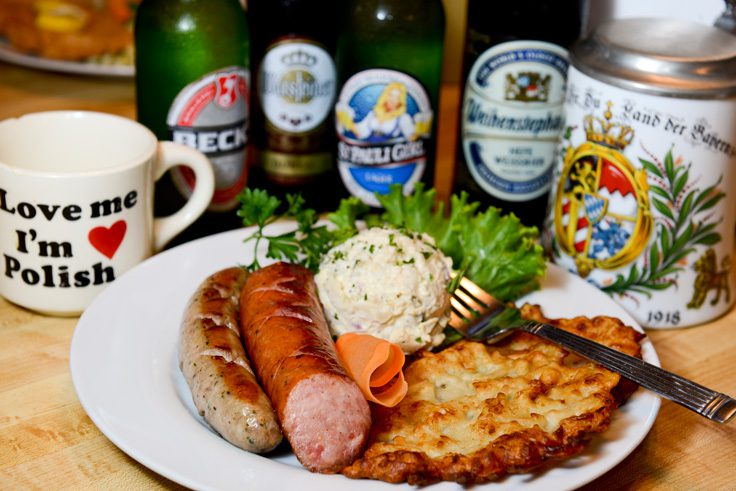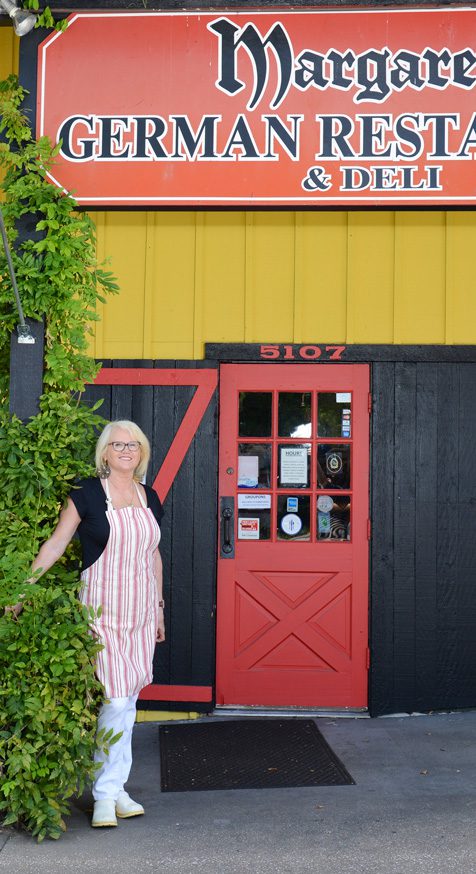
Photo by Natalie Green.
[dropcap]Margaret[/dropcap] Rzepczynski’s mother died when Rzepczynski was only 4 years old, and her father lovingly raised her and taught her how to cook a wide variety of dishes. She was young and flighty in those days and paid little attention.
“I preferred disco,” she recalls. “In Warsaw, those were the days of disco.”
But the giddy Warsaw nights of the ‘70s were soon replaced with political repression and martial law. In 1982, Rzepczynski and her husband, a tall and handsome athlete who once tried out for Poland’s Olympic team, fled Poland and ended up in an Austria refugee camp. And there they were stuck, until a Catholic priest, who somehow heard of their plight, arranged for them to come to Tulsa.
They had never heard of Tulsa, they spoke fewer than 10 words of English between them, but they came.
Rzepczynski had never loved cooking, but she realized that it was the only job where language proficiency was irrelevant. She found her way to the Westin Hotel, where the kitchen was the domain of a master chef named Jacques Lissonnet.
“I don’t speak English good, but I work very hard,” she told him. “Tomorrow 8 a.m.” he replied.
For five years she worked with, and learned from, Lissonnet.
“We bonded because neither of us spoke English,” Rzepczynski recalls.

Photo by Natalie Green.
Now at about this time, a man named Pierre VerHulst and his wife, Gerti, opened a German restaurant named Pierre’s Deli. The couple divorced and sold the restaurant to another family, the Arsalas. They, too, split up and offered the restaurant to Rzepczynski.
“People told me it was bad luck, divorces come in threes,” she says, “but it’s almost 40 years later, and Andrew and I are still happily married.”
The food served at Margaret’s is very filling, and so good it requires a major effort of will to stop eating. Soft, puffy pretzels appear at the table, followed by crisp, hot potato pancakes with applesauce. Then comes soup, or a bowl of kapusniak, and then heavy platters appear piled high with schnitzel or sauerbraten, a marinated beef delicacy that takes many days to make.
There’s also kassler rippchen, smoked pork with a rich, hammy flavor; and leberkaese, similar to bologna sausage. Along with the entrees come delicious side dishes. Crisp, tangy red cabbage; a rich, hot potato salad that is one of Pierre’s original recipes; earthy, mellow sauerkraut and those difficult to make but delicious Austrian gnocchi called spaetzle. And if somehow you’ve saved room for dessert, there are rich chocolate cakes available, but few manage to get that far.
“One of the secrets of our success,” says Rzepczynski, “is consistency. If you order something, you know it will be made the same as always. I’ve been to restaurants where they’ve had five chefs in five months, and you never know what you’re going to get. But here we’ve had the same chef for 13 years, and many of the waitresses have been here longer than five. Of course, in the beginning, I was the chef and the waitress and the cleaner-up, but I was living my life in the same small room and couldn’t continue that.”
With a tradition like this, regulars are inevitable.
“I know about half my customers. I see a pregnant woman with her husband, and then years later the same couple with a child, and then years after that a full-grown man comes in and says, ‘My parents used to take me here as a child.’”
Asked about gemutlichkeit, the German ideal of a place so welcoming that when you enter you feel as if you’ve come home and found your family, Rzepczynski cries, “Yes! That’s it exactly!”
5107 S. Sheridan Road, Tulsa. www.margaretsgermanrestaurant.com






















